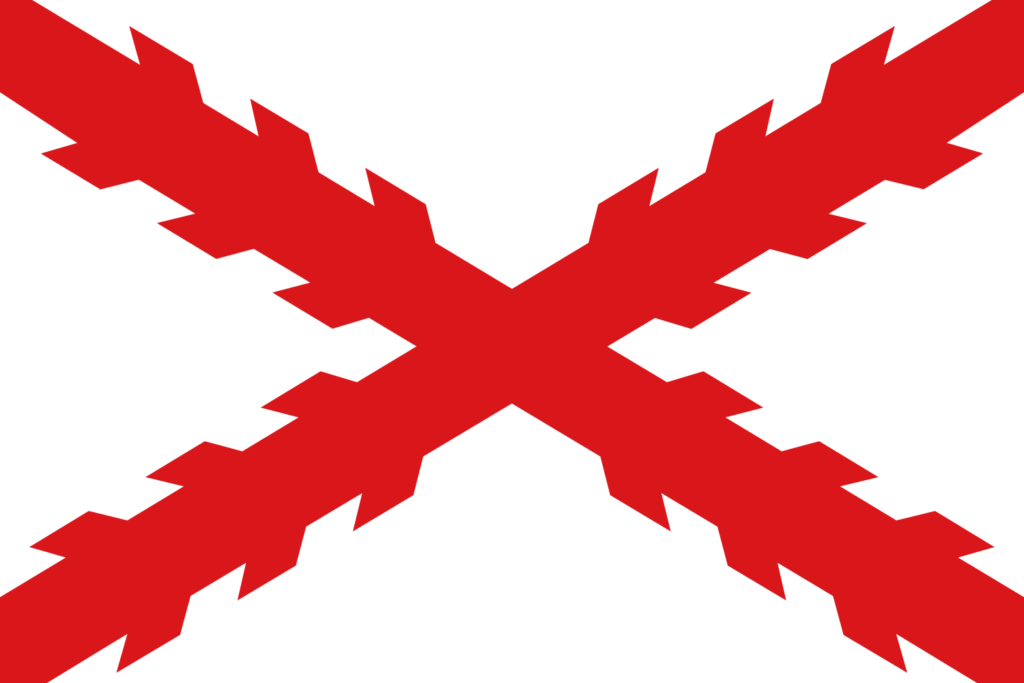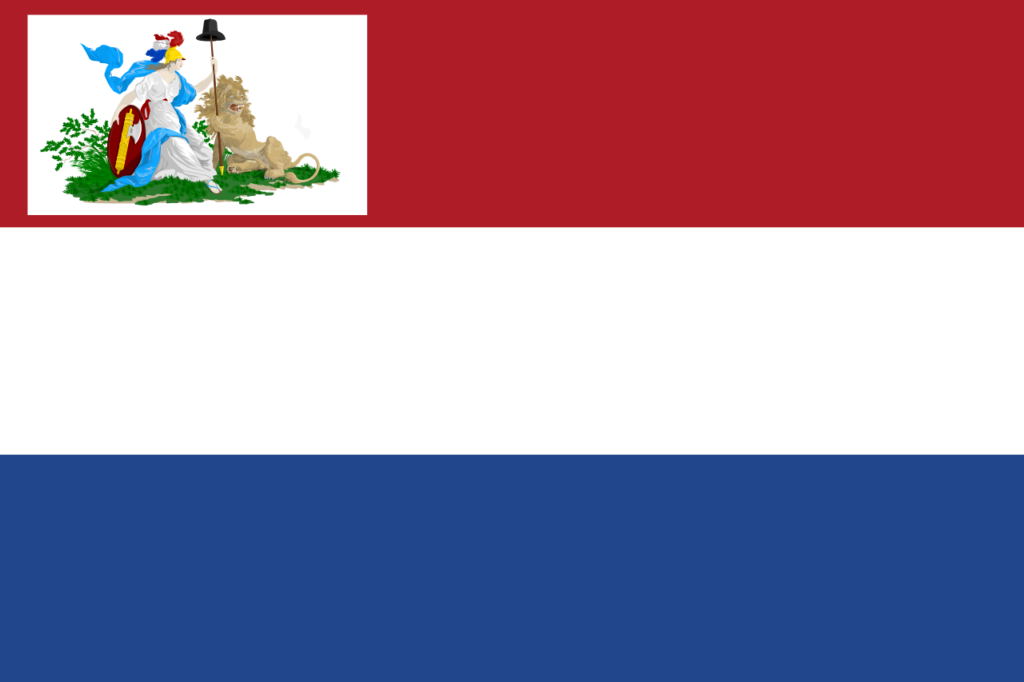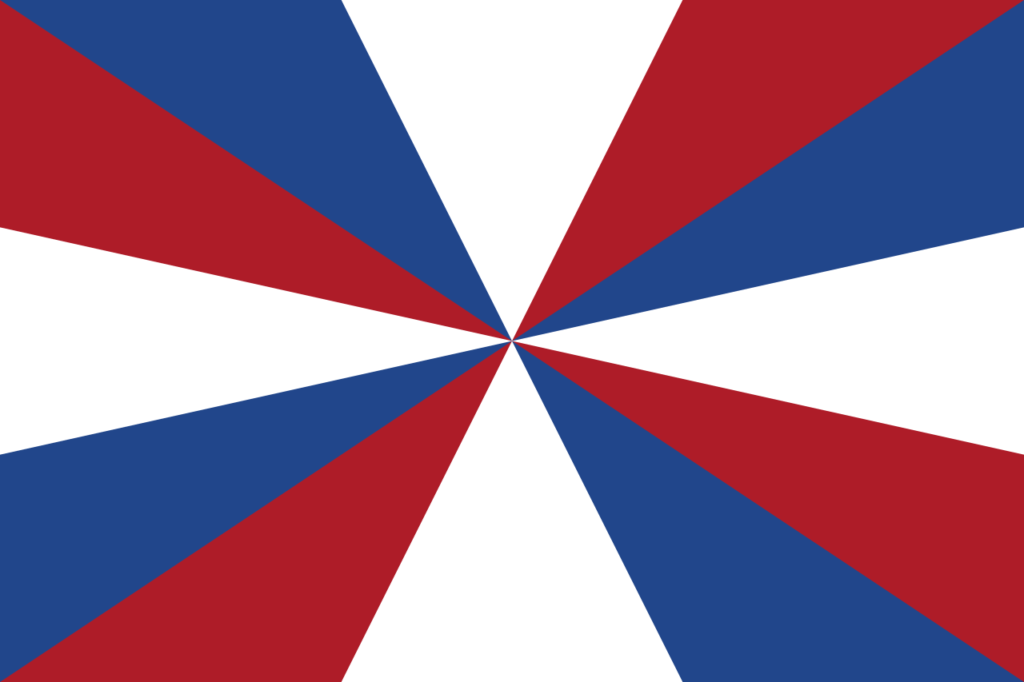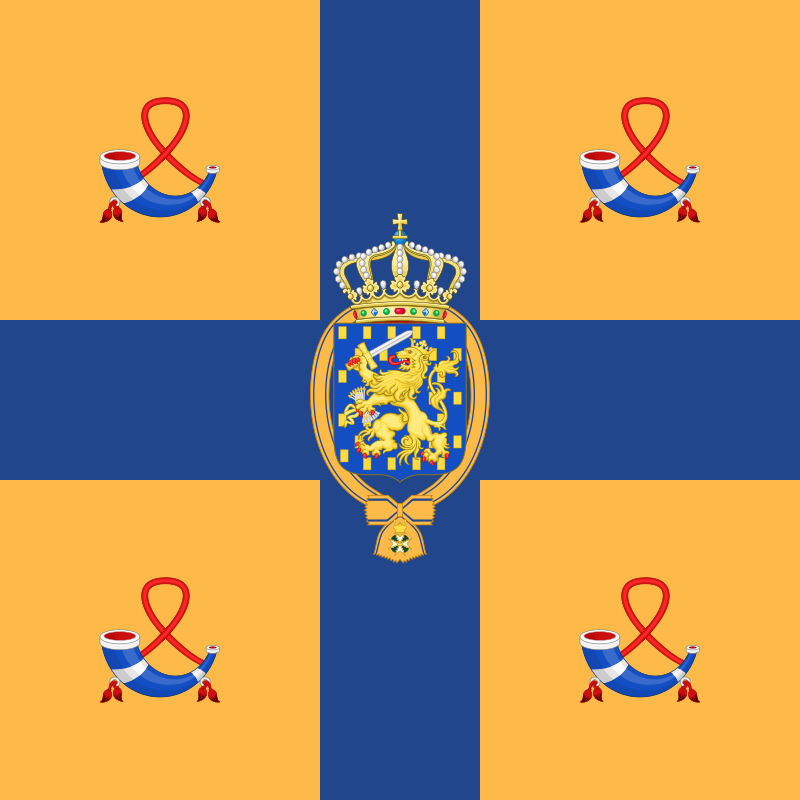The Netherlands is a Western European state occupying both mainland and island territory. Its modern symbol was created at the end of the eighteenth century.
This is what the modern flag of the Netherlands looks like:

Refers to the Pan-Slavic flags.
History of the flag
From the late fifteenth to the late sixteenth century the Netherlands used the Burgundian cross, which has a oblique branching shape. Its use was justified by the fact that the Netherlands belonged to Burgundy at that time.

From 1592 to 1795 used a tricolor with orange, white and blue colors, it was a historical symbol of the ruling dynasty.

It is believed that the reason for replacing orange and blue with red and blue is that at sea the colors, especially the lighter ones, burn out very quickly, soon becoming completely invisible and indistinguishable. That is why the lighter colors were replaced by darker ones.
Later the kingdom formed the Batavian Republic, its flag is the prototype of the present one, differing only in the fact that at the stem, in the upper left corner, there was a coat of arms. It was used from 1795 to 1806.

The Republic of the Netherlands was controlled by France, comprising eight united provinces.
After the dissolution, the modern flag used by the Dutch kingdom emerged.
Description
It is a tricolor with equal horizontal stripes. The aspect ratio is 2:3.
The flag of the Netherlands is similar to the flag of Luxembourg. The flags are so similar that in 1992 the Luxembourg government decided to change the color of the blue band to a lighter color to make the difference between them more obvious.
Colors of the Dutch flag
Red, white, blue.
Meaning of colors and flag symbol
- Red – spilled blood of warriors.
- White – freedom and independence.
- Blue – sea and belonging to the maritime powers.
Other Flags
The Huys (the Dutch ship’s flag) has the same colors. Each color forms a triangle, the vertices of which converge at one point in the center.

The flag of the Royal Navy is a blue cloth with four orange stripes on the left and, closer to the free part, a white anchor over which hangs a crown.

The royal standard is an orange square with the Nassau Cross, with the coat of arms of the state in the center and the coat of arms of Orange in each square, separated by a cross.

Despite the similarity to other flags, the Kingdom is not going to change it in any way, and the locals are very proud of their symbol.
General information about the Netherlands
| Official language | Dutch, West Frisian (regional) |
| Capital | Amsterdam |
| Territory | 41 543 km² |
| Population | 17 333 790 people |
| Currency | Euro (EUR, code 978) |
| Phone Code | +31 |










Комментарий от имени Марка:
“Флаг Нидерландов — это не просто трёхцветный стандарт, а символ многообразной истории и культуры этой страны. Красный, белый и синий цвета олицетворяют различные аспекты голландского наследия. Интересно, что его популярность распространилась за пределы Нидерландов, вдохновив другие страны на создание своих флагов. История флага также напоминает нам о борьбе за независимость и решении, которые формировали нацию. Я всегда восхищался тем, как флаг соединяет людей в едином порыве гордости за свою страну!”
Ответ от Аделины: “Согласна, Марк! Флаг действительно олицетворяет единство и историю. Я иногда ощущаю эту связь, когда вижу флаг на праздниках. Это напоминает о нашем культурном наследии и создает атмосферу гордости. Каждый штрих цвета имеет свою историю, и это вдохновляет!”
Максим: Согласен с тобой, Аделина! Когда я вижу флаг на мероприятиях, у меня тоже возникают воспоминания о праздниках с семьёй. Это как связь поколений — флаг напоминает нам о том, что мы часть чего-то большего, и это действительно вдохновляет!
William: Totally get what you’re saying, Максим! Flags really do bring back those special memories. I remember seeing our national flag at a family reunion and it reminded me of all the traditions my grandparents passed down. It really makes you feel connected to your roots!
Ответ от Елизаветы: “Полностью согласна, Марк! Флаг действительно несет в себе глубокую историю. Мне всегда нравилось, как символы объединяют людей. В нашей семье также есть подобная традиция — мы вывешиваем флаги на праздники, это создает атмосферу единства и гордости за свою культуру!”
Согласен, Елизавета! У нас дома тоже есть такая традиция. Каждый год на День Победы мы вывешиваем флаг. Это не просто символ, а ощущение общности и уважения к предкам. Такие моменты действительно делают праздник особенным!
Согласна полностью! Мы с семьей тоже всегда вывешиваем флаг. Это как связь с нашими корнями и памятью. В прошлом году, когда смотрели парад, чувствовала гордость. Такие традиции действительно создают атмосферу и запоминаются на всю жизнь!
Hey! Totally feel you on that. We do similar things for Memorial Day. It’s like a reminder of where we come from and honoring those who sacrificed so much. It really brings the family together and makes the day feel more meaningful.
Absolutely, I feel the same way! Every year, we hang our flag too. It brings back memories of family gatherings, sharing stories about our ancestors. Those moments of connection really turn a regular celebration into something meaningful. It’s great to honor their sacrifices together!
I totally get that! Hanging the flag always reminds me of my family reunions too. We share stories that help us feel close, even to those who aren’t with us anymore. It’s like keeping their spirit alive and celebrating what they stood for. It really adds depth to our celebrations!
Absolutely, I feel the same way! We also put up a flag every Victory Day. It really brings everyone together and reminds us of our history. Last year, we even invited neighbors to join us—it turned into a lovely and memorable celebration!
Absolutely, I totally get that! We also hang our flag on special days. It’s more than just a decoration; it feels like connecting with those who came before us. Those moments really bring everyone together and make the celebration unforgettable!
Ответ от Алёны: “Ты совершенно прав, Марк! Флаг действительно объединяет людей. Я однажды была в Нидерландах и увидела, как местные празднуют с флагом на каждом углу. Это было так вдохновляюще! Символика флага создает ощущение единства и гордости за свою культуру!”
Ответ от Вероники: Полностью согласна, Алёна! Я тоже на празднике в своей стране заметила, как флаг объединяет всех. Это как магниты — притягивает людей вместе. Когда видишь, как все гордятся своей культурой, сразу появляется теплота и чувство принадлежности.
I visited the Netherlands last summer and saw the flag everywhere! It was fascinating to learn about its history and symbolism. I even took a picture in front of a windmill with the flag flying high. It made me appreciate their culture even more. Such a memorable trip!